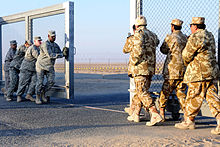Timeline of the Iraqi insurgency (2011–2013)
Appearance
| Iraqi insurgency | |||||||
|---|---|---|---|---|---|---|---|
| Part of the Iraqi conflict (2003–present) | |||||||
 U.S. and Kuwaiti troops unite to close the gate between Kuwait and Iraq after the last military convoy passed through on Dec. 18, 2011, signaling the end of Operation New Dawn and the beginning of the post-U.S. phase of the insurgency | |||||||
| |||||||
| Belligerents | |||||||
|
Other Sunni insurgents |
Supported by: | ||||||
| Commanders and leaders | |||||||
|
|
| ||||||
| Strength | |||||||
|
Supreme Command for Jihad and Liberation: 2,000–3,000[2] Islamic Army in Iraq: 10,400 (2007)[3] Al-Qaeda: 1,000–2,000[4] JRTN: 1,500-5,000[5] |
Iraqi Security Forces 600,000 (300,000 Army and 300,000 Police)[6] Awakening Council militias – 30,000[7] Contractors ~7,000[8][9] | ||||||
| Casualties and losses | |||||||
| 919+ insurgents killed, 3,504 arrested |
| ||||||
The following is a timeline of major events during the Iraqi insurgency (2011–2013):
- Timeline of the Iraqi insurgency (2011)
- Timeline of the Iraqi insurgency (2012)
- Timeline of the Iraqi insurgency (2013)
References
[edit]- ^ "Al-Qaeda's Resurgence in Iraq: A Threat to U.S. Interests". U.S Department of State. 5 February 2014. Retrieved 26 November 2010.
- ^ "Insurgent group looks to future without U.S." Stars and Stripes. April 3, 2009.
- ^ Daniel Cassman. "Islamic Army in Iraq | Mapping Militant Organizations". Stanford.edu. Retrieved 2012-09-14.
- ^ Office of the Coordinator for Counterterrorism (July 31, 2012). "Country Reports on Terrorism 2011". U.S. Department of State.
- ^ Knights, Michael (1 July 2011). "The JRTN Movement and Iraq's Next Insurgency". Combating Terrorism Center at West Point. Archived from the original on 10 October 2017. Retrieved 2 November 2014.
- ^ Collins, Chris (19 August 2007). "U.S. says Iranians train Iraqi insurgents". McClatchy Newspapers.
- ^ "A Dark Side to Iraq 'Awakening' Groups". International Herald Tribune. www.military.com. 4 January 2008. Retrieved 22 April 2012.
- ^ Miller, T. Christian (4 July 2007). "Private contractors outnumber U.S. troops in Iraq". Los Angeles Times. Archived from the original on 2 September 2007. Retrieved 2 November 2014.
- ^ Roberts, Michelle (24 February 2007). "Contractor deaths add up in Iraq". Deseret Morning News.
- ^ "Iraq Government Casualty Figures via AFP (Google Docs)". Retrieved 2014-07-31.
- ^ "Documented civilian deaths from violence". Iraq Body Count database. Iraq Body Count. 2012-07-24. Retrieved 2012-09-02.
